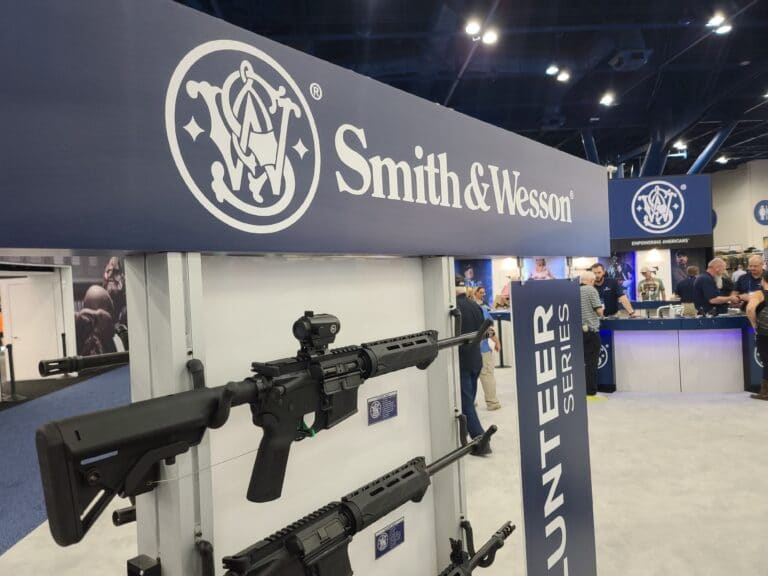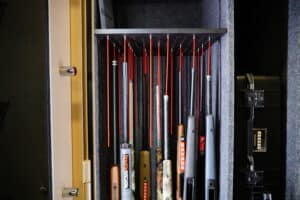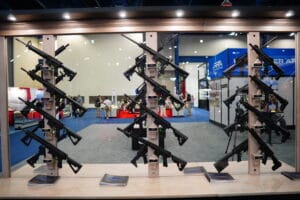An Illinois judge greenlit a liability lawsuit against one of the nation’s largest gunmakers on Tuesday.
Judge Jorge L. Ortiz dismissed some of the claims Highland Park shooting victims brought against Smith and Wesson, but allowed others to move forward. He did the same for Bud’s Gun Shop and Red Dot Arms. He said the plaintiffs had articulated a claim not blocked by the federal Protection of Lawful Commerce in Arms Act (PLCAA).
“[H]ere Plaintiffs have sufficiently alleged that Smith & Wesson’s unlawful conduct created a condition that foreseeably led to the shooter’s criminal act,” Judge Ortiz wrote in Roberts v. Smith and Wesson. “The Complaints allege: (1) AR-15 style firearms, in particular the Smith & Wesson M&P 15 rifle, are the weapon of choice for mass shooters; (2) mass shooters are typically impulsive young men with hero complexes and delusions of militaristic grandeur; and (3) Smith & Wesson purposefully targeted its marketing of AR-15 style firearms at this group by employing tactics and themes it knew would be disproportionately attractive to dangerous people like the shooter.”
The ruling comes just after the Pennsylvania Supreme Court unanimously tossed a similar suit against Springfield Armory over the accidental shooting of one teen by another. After the Pennsylvania setback, the Illinois decision boosts the decades-long effort by gun-control advocates to hold gun companies responsible for crimes committed with their guns by other people. It could also provide a framework for bypassing PLCAA protections in other cases.
Even if the plaintiffs ultimately fail to win on the case’s merits, just getting past the dismissal stage will likely cost the gun companies a lot of money. In fact, Smith and Wesson has already had to fork over hundreds of thousands in legal fees to the plaintiffs after they tried and failed to have the case removed to federal court.
Gun-rights activists decried Judge Ortiz’s ruling. The Second Amendment Foundation labeled the case “lawfare” and said it was exactly what Congress created the PLCAA to prevent.
“Smith & Wesson, like any number of other manufacturers in other industries, had absolutely no control over the criminal misuse of their product,” Adam Kraut, the group’s executive director, said in a statement. “Allowing these types of lawsuits to proceed only invites further litigation against firearms manufacturers to drive them out of business through lawfare. While such an end result may be the desired effect by the anti-gun crowd, it would be detrimental to the exercise of Second Amendment rights and also national defense.”
On the other side, Everytown for Gun Safety called the ruling a “major victory.” The gun-control group, which is helping to represent the plaintiffs in the case, accused the gun companies of
“Today’s historic decision sends a clear message that the gun industry does not have carte blanche to engage in irresponsible marketing of assault rifles, without any concern for the obvious dangers of such marketing,” the plaintiffs’ lawyers said in a statement. “We are also pleased that our claims against the firearms retailers for selling an assault rifle to someone who lived in a town where he was prohibited from having one are allowed to go forth. We are steadfast in our fight to hold the defendants accountable for the damage their conduct has caused, and look forward to the truth coming out as this case proceeds to discovery.”
The suit stems from the July 4th, 2022, shooting at a Highland Park, Illinois parade. A gunman, who pled guilty to all charges earlier this year, killed seven people and injured dozens more. He used a Smith and Wesson M&P branded AR-15 bought from Bud’s Gun Shop and transferred through local dealer Red Dot Arms to carry out his attack.
In September 2022, a number of the shooting’s survivors filed suit against the gun companies, alleging they violated the Illinois Consumer Fraud and Deceptive Business Practices Act (CFA) among other state laws. They claimed Smith and Wesson’s M&P branding, which stands for Military and Police, was misleading and helped push the shooter to carry out his attack.
Judge Ortiz concluded those were strong enough arguments to let the case proceed.
“Here, the Plaintiffs’ allegations demonstrate Smith & Wesson went beyond passively hosting advertisements posted by a third party on a website,” he wrote. “The allegations state Smith & Wesson engaged in a pervasive marketing campaign designed to specifically target and motivate people like the shooter and to prime them to use products like the Rifle in mass shootings. The Complaint allegations go far beyond stating Smith & Wesson enabled the shooter, but engaged in affirmative acts to encourage the shooter to commit the illegal acts. Thus, the finding of a ‘special relationship’ is not required here.”
“Moreover, the Plaintiffs have sufficiently established that even if a common law duty of care does not exist, Smith & Wesson owed duties based on statutory law. Plaintiffs state the CFA sets out a duty on the part of all companies that do business in Illinois to refrain from “unfair or deceptive acts or practices.” [T]he CFA confirms that the Act has always applied to firearms companies and specifies that the duty to refrain from unfair acts includes a duty to refrain from encouraging individuals who are not members of the military ‘to use a firearm-related product for a military-related purpose in Illinois.'”
The plaintiffs also claimed Bud’s Gun Shop and Red Dot Arms were partially responsible for the shooting because, even though the shooter passed a background check, they shouldn’t have sold him the gun because of his age and where he lived. Judge Ortiz agreed.
“In this case, Plaintiffs allege the Gun Store Defendants knew or had reason to know that the shooter resided in a municipality that prohibited the possession of assault weapons, including the M&P 15,” he wrote. “The Gun Store Defendants knew the shooter was 19 and wanted a brand of assault rifle that was most associated with mass shootings. They knew or should have known that young men had carried out some of the most horrific mass shootings in U.S. history. The shooter’s age put him in the demographic that had used the M&P 15 to carry out these shootings. These are allegations that the Court takes as true and all inferences therefrom. Plaintiffs have sufficiently alleged a number of red flags of the shooter that Red Dot and Buds knew or should have known would make it likely for the shooter to use the rifle in a manner involving unreasonable risk of injury to others. Accordingly, the Uvaldo Plaintiffs have sufficiently pled a cause of action for negligent entrustment.”
Smith and Wesson, Bud’s Gun Shop, and Red Dot Arms did not respond to a request for comment.







Only Members can view comments. Become a member today to join the conversation.